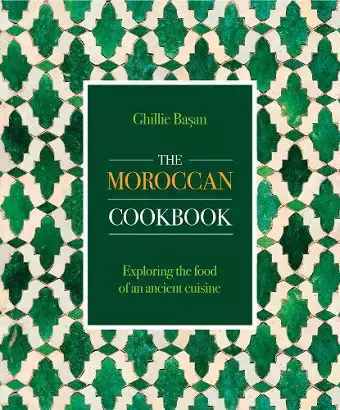The Moroccan Cookbook
Exploring the food of a timeless cuisine
Format:Hardback
Publisher:Anness Publishing
Published:30th Jun '25
Should be back in stock very soon

LONGLISTED FOR THE ANDRE SIMON FOOD & DRINK BOOK AWARDS 2025.
The culmination of years of research, this evocative volume in an extended and updated new edition by award-winning author and cook Ghillie Basan looks in detail at the history and geography, customs and festivities, as well as all the local ingredients, and presents a mouthwatering selection of classic recipes, with beautifully pictures throughout, including new footage from Alice Morrison, adventurer and photographer (and resident of Imil, Morocco).
Chrissie Walker, Mostly Food: "A Tapestry of Tastes. Hospitality is key to the culture of Morocco. The Moroccan Cookbook is a gorgeous representation of the delicious food of this unique region. At the root of the culinary culture are the indigenous Amazigh, the Berber communities, with their traditions of tagines and couscous which are already popular outside of Morocco. The nomadic Bedouins from the desert added dates, milk and grains to the array, and the Moors expelled from Spain introduced olives and olive oil, paprika and herbs. The Sephardic Jews introduced preserving techniques, and Arabs enhanced the mix with flavours of the Middle East. The Ottoman influence of kebabs and pastry-making is still evident, and the French brought a little je ne sais quoi. The Moroccan Cookbook is gift quality and the perfect guide to vibrant flavours and dishes made with fresh ingredients. My copy is marked with coloured tabs of recipes tried and those to enjoy in the future. The book includes a culinary history and recipes for every course, with dishes for casual meals through to dinner parties. My picks of the book include Bissara dip with zaatar, roasted red peppers with capers and preserved lemon, saffron fish cakes, Casablancan baked stuffed tomatoes, prawn tagine, saffron and cardamom creme caramel, iced mint and orange tea."
"From Ghillie Basan, a tome about her love for Moroccan cuisine. If you thought it's all tagines, think again! The first 75 pages set the scene, giving an insight into Moroccan culture and geography, and how they impact the nation's food. From there on it's 275 pages of gorgeous recipes that reveal an unexpectedly rich culinary culture." Richard Bath, Scottish Field Magazine, August 2025
"It's a fabulous book - a veritable trip to Morocco" Alison Jee, RiverTribe/Women Talking August 2025
ISBN: 9780754835646
Dimensions: unknown
Weight: unknown
368 pages